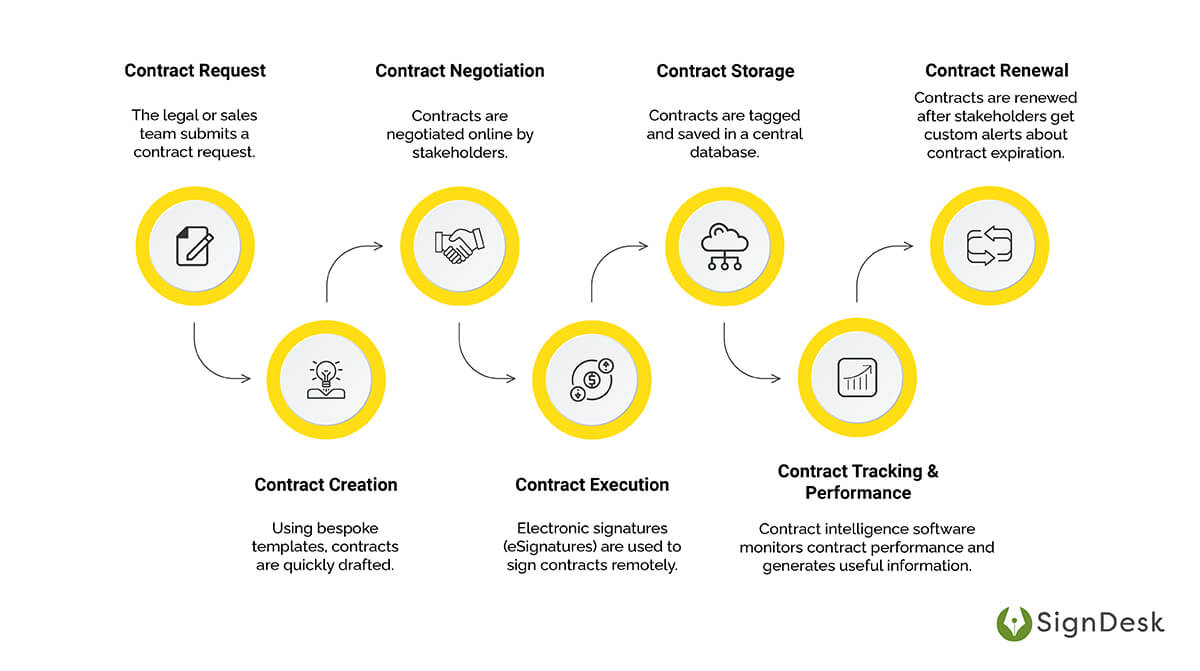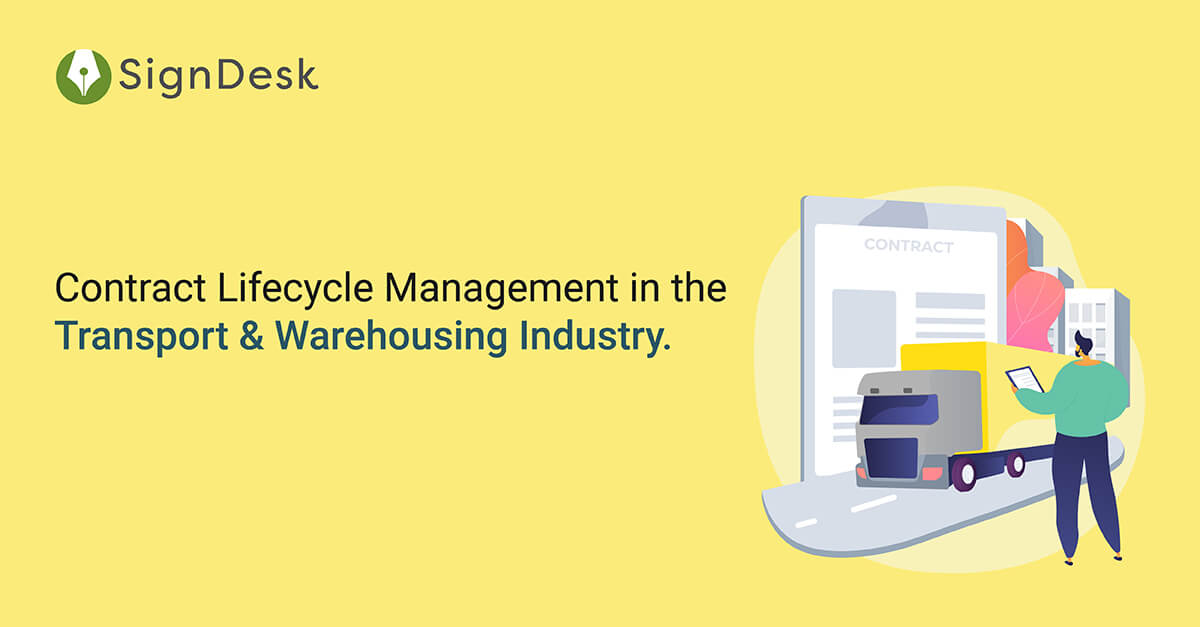Widespread Digitization in Transport and Warehousing
Due to the advent of e-commerce and globalization, the transportation and logistics business has seen tremendous expansion in the previous decade. Service providers must delve into digital software for transport companies. They also need to go through unprecedented disruption by transforming technology as well as processes inherent in legacy systems to stay afloat in this uphill environment via logistics contracts. For these transport & warehousing contracts and the contract management system, contract automation is quickly becoming indispensable.
The transportation and logistics business is on the verge of a significant technological shift. Due to the advent of e-commerce, globalization, and rising disposable income, the business has seen tremendous growth in the recent decade. Increased client expectations, the rise of automation, and advanced technologies have forced businesses to embrace digitalization to stay competitive.
Contract lifecycle management is one procedure that is inherently inefficient when done manually (CLM), especially for transport and logistics contracts. This, combined with the requirement to demonstrate compliance with federal, state, municipal, and international legislation, is driving businesses like yours to seek a solution that can simplify and streamline the contract lifecycle process across the board.
What is Contract Lifecycle Management?
Contract Lifecycle Management, or CLM software, is the use of a set of smart automation platforms to aid in the attainment of a contract’s goal, compliance with duties, and risk avoidance or mitigation.
According to the International Association for Contract & Commercial Management (IACCM), contract development and management that is done well can increase profitability by as much as 9% of annual sales.
Contract Lifecycle Management entails a series of processes that take into account each stage of a contract’s lifetime and the contract management system –

Contract Request: The legal or sales team submits a contract request.
Contract Creation: Using bespoke templates, contracts are quickly drafted.
Contract Negotiation: Contracts are negotiated online by stakeholders.
Contract Execution: Electronic signatures (eSignatures) are used to sign contracts remotely.
Contract Storage: Contracts are tagged and saved in a central database.
Contract Tracking & Performance: Contract intelligence software monitors contract performance and generates useful information.
Contract Renewal: Contracts are renewed after stakeholders get custom alerts about contract expiration.
Commercial Contract Compliance: Commercial contracts are regularly reviewed to ensure compliance with agreed-upon terms and applicable regulations throughout the contract lifecycle.
Smart contract management and the CLM software that is used is an automated process that may assist firms to develop an audit trail for compliance and managing the risks connected with the pharmaceutical industry, as well as decrease the costs and man-hours required in contracting.
What is a Transport or Warehousing Contract?
Almost every firm has a relationship with a transportation provider that will or should be formalized in the future. A transportation contract agreement is a legally binding agreement that covers freight transportation services such as domestic freight forwarding, motor carriers, local rail drayage, domestic water carriers, and other similar services.
However, transportation services purchased by domestic or international air carriers or international water carriers, as well as freight services negotiated for cheaper rates or performed under bills of lading, are not covered by a transport contract.
What Do Transport & Warehousing Contracts Include?
Although the format and substance of transportation contracts can vary greatly, they often include the following items:
-
Payment and Billing
A transportation contract must include specific billing and payment details, such as payment due dates and late payment penalties, such as interest, collection costs, and legal fees.
-
Warranties and Certifications
It’s critical not to make promises that are impossible to keep, such as the exact pickup or delivery time, perfect contentment, or complete compliance with all regulations. If you’re dealing with a lot of pressure, try utilizing contract language that keeps promises to a minimum.
-
Damages as a Result
In a transportation contract, there should also be a waiver of consequential damages. Loss of profits or other sorts of indirect loss, as well as the closing down of manufacturing processes that are only tangentially related to your services, are examples of such damages.
-
Safety
A safety clause should be included in your transportation contract. This clause should state unequivocally that the person or entity performing a specific task is responsible for job safety.
-
Limitation of Liability
In your transportation contract, you should also add a liability limitation clause. If a claim emerges from the supply of transportation services, this clause will state the maximum amount of responsibility you will be liable for.
Challenges in Transport and Warehousing Agreement
The old, manual contract management approach is heavily reliant on the transportation and logistics contract as well as the warehouse storage agreement. The challenges are as follows:
-
Contract Visibility Is Limited:
Large firms’ top contract management concern remains to be a lack of contract visibility. Contracts can be kept in Outlook inboxes, shared files on a local network, or even filing cabinets. When concerns occur that necessitate contract review, finding them can be difficult or impossible. “Several Gartner clients honestly confess they don’t know where all their contracts are,” according to a recent Gartner research.
-
Non-compliance with contracts:
Today’s businesses work in highly regulated environments, and badly handled contracts make compliance difficult, if not impossible. Consider the General Data Protection Regulation (GDPR) of the European Union, which mandates that enterprises pass rigorous data-privacy requirements down to their subcontractors. Companies risk non-compliance and large fines if they don’t have a systematic approach to tracking the inclusion of relevant regulatory language in all contracts.
-
Lack of Contract Standardization
A profusion of contract terms and templates in circulation is a common contract management concern for businesses employing ad-hoc contract authoring processes. When contracts become non-standardized, the legal department is responsible for reading each contract line by line to ensure the agreements do not put the organization in danger.
-
Separate Contract Processes from Other Systems
Manual contract management, like the contract management issue discussed above, does not allow contract management actions to take place in the context of software that business users use on a daily basis. To create a client contract, salespeople must leave their CRM program; purchasers must leave their procure-to-pay system, and so on. It’s been proven that switching contexts reduces protectivity.
-
Missed Contract Expiry and Renewals
Lapsed contract expiration is a contract management issue that many large firms continue to grapple with, as simple as it sounds. Contract expirations and renewals are, at best, an inconvenience that impedes company performance. They can substantially hurt a company’s financial line in the worst-case scenario.
How Smart Contract Automation Streamlines Transport and Logistics Contracting
-
Author contracts instantly and keep track of their versions:
Using pre-approved templates and clauses, the software for transport company solutions make the drafting process easier. After the contract is drafted, the negotiation process begins, and several contract versions are developed along the process. This will make it more difficult to track the most recent contract version and raise the risk of delivering the incorrect papers for review and approval. The inbuilt version comparison tool in the version management system allows you to stay up to date on the current version and instantly find the terms that were negotiated in the prior version.
-
Automate Contract Lifecycle Management:
The CLM solution will automate several parts of the contract life-cycle, from contract drafting to contract review, approval, and signing using integrated electronic signature technology. The CLM solution gives you a comprehensive image of the contract’s current state, as well as why and with whom it is stuck. It cuts the contract lifecycle time in half and gets the deal done in half the time.
-
Maintain a searchable centralized repository:
The backbone of a contract management process is centralization, which supports and enables all other aspects of contract administration. Important operations like reporting and analysis become practically impossible without a single home for documents and data. Without a good system in place, searching for a specific contract from enormous, dispersed contract libraries can be a major nuisance.
CLM software allows the user to create a centralized electronic repository for all of the contracts, allowing one to manage and safeguard them more easily. The user can filter out contracts in any way they choose with its advanced filtering capability. Once the contracts are centralized, the user may set strict accessibility requirements and control who has access to them and with what permissions.
-
Streamline contract performance monitoring:
Contracts are at the heart of the transport and storage industry, and numerous high-value contracts are frequently active at the same time. It is critical for all businesses to keep track of the performance of these contracts in order to assure maximum returns. One can use the CLM solution to define performance monitoring tasks and milestones for contracts, receive notifications when an event occurs, and ensure that the agreed-upon deadlines and terms and conditions are met.
Automate & Expedite Service Contracts Instantly with SignDesk’s Smart CLM
Business teams may design contracts and negotiate clauses in real-time with SignDesk’s end-to-end contract management tools – CONTR.ACT.
CONTR.ACT also provides simple eSignature and eStamping connectivity for completing contracts fast and securely, as well as AI-powered contract analytics to help organizations become wiser.
With SignDesk’s smart CLM, businesses can manage all company contracts online and enable a smooth workflow process while decreasing TAT by more than 50%.
Contact one of our sales professionals to learn more about how our contract lifecycle management works.
Get a free trial now!
